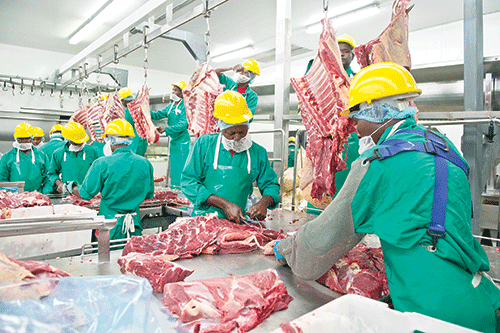Despite government spending N$600 million to support the Meat Corporation of Namibia (Meatco) and abattoirs in the north over the past three years, only N$32 million has in fact ended up in the pockets north of the redline.
The amount, which points to a severe neglect to farmers in the northern communal areas (NCAs), is acknowledged in a damning forensic report into Meatco’s affairs by Ombu Capital, a private equity firm owned by former commercial bank CEO Vetumbuavi Mungunda.
The document, seen by New Era, was submitted to Cabinet earlier this year.
Among others, it seeks to advise the Executive on what to do with the beleaguered meat parastatal. This follows agriculture minister Calle Schlettwein’s admission that the meat corporation is technically in an intensive care unit.
The minister proverbially said government must decide to terminate Meatco’s life support system, or try to breathe new life into its ailing health. Regardless of which route, the situation remains precarious either way.
And now, details pointing to a neglect of farmers north of the notorious veterinary cordon fence (VCF) have emerged.
“Direct benefits by the communal farmers from amounts spent by the government in the sector is negligible. Despite government spending over N$600 million in supporting Meatco and abattoirs in the NCAs over the last three years, direct proceeds or revenue to the NCAs farmers amounted to only N$32 million for 2021 and 2022. In the south of the veterinary cordon fence (SVCF), communal, emerging commercial and resettled farmers constituted less than 5% of the producers delivering directly to Meatco,” Mungunda’s firm discovered.
To help rectify this, Ombu proposes a targeted focus on social development objectives through an appropriate structure at the producer level. This, it advises, is best positioned to address Namibia’s context with respect to communal farmers north and south of the redline. “It is imperative that social inclusiveness and transformation are addressed across the value chain and not only at the processor stage. The attempt to address social inclusiveness at a processor level has not had much positive impact for the communal farmers in the north of the veterinary cordon fence (NVCF or NCAs) or SVCF, and nor for the emerging commercial and resettlement farmers,” the report emphasised.
Different approach
What is more, Ombu Capital also suggested that a different marketing approach is needed regarding cattle in the NCAs.
“Marketing of cattle from the NCAs requires a different approach because of animal health status and the relatively small frame of cattle. Historically, it has also been a challenge to receive cattle for slaughter at an appropriate age,” the firm suggests.
Between 2010 and 2015, export abattoirs in NCAs marketed an average of 15 000 cattle per year, a figure considered too low when juxtaposed against herd size in the area.
Against the total estimated cattle herd of 1.4 million in the NCAs, the historic 15 000 cattle slaughtered represent a paltry 2% to 3% market off-take compared to the 30% south of the redline and the global benchmark of 40%.
In 2021, a total of 1 528 cattle were slaughtered at export abattoirs in the NCAs compared to 110 in 2020.
“Cattle numbers slaughtered for both NCAs abattoirs and butchers have been dwindling, reaching the lowest point in 2016 due to the closure of abattoirs in 2015. Between 1992 to 2015, an average of 15 000 cattle were marketed in the NCAs, with annual losses in the order of N$30 million to N$45 million per annum incurred by Meatco’s operations in the area,” the Ombu report revealed.
Revival
After at least five years of closure, Meatco relaunched its NCAs operations in 2020 under then new CEO, Mwilima Mushokabanji. His mandate was simple: to unlock opportunities in the primary beef value chain of the NCAs.
The premise of the mandate was simple; to realise the same value for farmers north and south of the redline.
The Ombu report zeroed in on this: “The main challenges for the NCAs subsidiary relate to the figures shown above relating to the low off-take of cattle, as well as the costs to farmers, like transportation. The NCAs revenue when viewed since 2017 has increased with the increase in cattle numbers slaughtered (from a very low base). It has however not been able to become profitable with annual losses recorded and this has continued since the official launch of the NCAs subsidiary.”
It continued: “The issue of markets for animals slaughtered NVCF remains a challenge which has not been fully resolved in decades. The current market distribution of the NCAs subsidiaries main clients show that the MeatMa Bonanza outlet in Oshakati is the single biggest outlet for NCAs beef after which these products are sold in the SVCF, often for value added processing. While Meatco has been on a hyped drive to create markets for beef emanating from the north of the redline.”
Meanwhile, the report notes that three sub-Saharan markets of Angola, DRC and Ghana comprise only 23% of NCAS marketed beef. This shows market access does not necessarily equate to sales and that Meatco and Namibia in general, do not have well developed routes to market for the NCAS products.
Earlier this year, New Era lifted the veil on concerted efforts by previously advantaged farmers’ attempts to collapse Meatco’s northern operations. This was after commercial farmers wrote to authorities in Ghana to discontinue importing beef from NCAs, claiming Foot and Mouth Disease infection. Both Mushokabanji and Schlettwein confirmed efforts to sabotage Meatco’s NCAs operations.
Last week, New Era also reported Meatco’s losses of N$5 million weekly and N$20 million monthly.
According to another media report, Meatco’s annual general meeting over the weekend was called off after it failed to meet the required quorum. The corporation must now call for a special AGM within the next three weeks. -emumbuu@nepc.com.na


